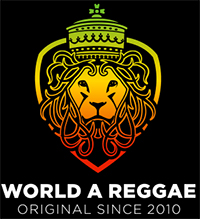READIES THE RELEASE OF TWO ALBUMS IN THE FALL WITH NEW BAND ‘LOVE’
Photo by Diego Fioravanti
There was no way for Julian “Junior” Marvin to know, when he left Jamaica at 9 years old for a new life in London, that he would one day find himself in this sort of predicament. It’s February 14, 1977 and Marvin is sitting next to Island Records Chief Chris Blackwell as Blackwell drives his Rolls Royce through the streets of North London on the way to a meeting. With who? Blackwell didn’t say. Marvin, guitar always in tow, knows one thing. He just got the most amazing phone call he ever could have imagined.
“Julian,” the caller says, sounding muffled.
Marvin recognizes the voice but just can’t seem to place it.
“Yeah, who’s this?” Marvin replies.
“It’s Stevie man, Stevie Wonder. I’m calling from the U.S.”
“Hey, Stevie! What’s up my brother!” Marvin replies, still not sure what to think.
“Look, my man Marlo (Henderson, guitar) had to pull out of the tour. I’d like you to come join us. I’m willing to offer you a contract. 10 years.”
Marvin hears Blackwell’s Rolls Royce pull up the street outside his flat.
“Yeah, that sounds great Stevie! We’ll work this out. Let me call you in a bit. Just about to take a meeting.”
With that, he grabs his guitar and heads out with Blackwell.
As Blackwell turns onto Oakley street and parks his Rolls, Marvin considers bringing it up. Just to see what Blackwell has to say about it. He leaves it alone.
They walk into a nicely furnished apartment. There’s a man across the room with his back turned. Not just any man. A man, short in stature, thin, with long-flowing dreadlocks. The man offers a smile to his visitors.
“So you de guitar playa all a dem talkin”bout?”
“This man with his back to him and big dreads and an even bigger aura. Some people you never see an aura around them – and with his back to me I saw this big aura and he turned around and I saw this really good looking man with a big grin on his face and it was Bob Marley” said Marvin in a May 2012 interview with L.A.journalist Jennice Fuentes.
Bob has spent the last month or so in London. On the run for his life after an assassination attempt at his home in Jamaica. An attempt that nearly took the life of his wife and manager. All of the heat in Jamaica over the past few months sent Wailers’ lead guitarist Donald Kinsey packing back to the States.
The two musicians sit and jam for hours. Marley offers him the job as lead guitarist. Their inherent bond as displaced Jamaicans makes the decision one that Junior does not regret.
The first album he records with Marley, “Exodus,” is now considered to be the greatest popular rock album of the 20th century. Just a few short months after meeting Marley, Marvin is being showcased several nights onstage at the London’s legendary Rainbow Theatre, pleasing the standing crowd with screaming guitar solos on songs like “The Heathen” and “Lively Up Yourself.” The rest is music history, really. It’s a story everybody knows: Kaya, Survival, Uprising, Confrontation, Legend. Of course he lost his “skip” (short for “skipper’) along the way. However, before leaving on his next journey, Marley told Junior that the show must go on. His message must be heard in every corner of the globe. On every street corner, in every ghetto, in every cave, every square inch of the planet must hear about ‘One Love.’
“Bob always wanted his music to be played in every area,” Marvin says during our recent conversation. In Jamaica, the ghetto – that’s where it started. In America, he wanted it to be played in the urban areas. Not only to be played, but understood – the language. He wanted his songs to be sung in Portugese, French, Italian, and translated so people would get the message rather than just the beat, you know?”
So that’s what Marvin has done for the past 30 years: spread Bob’s message of ‘One Love.’ First as the front man of The Wailers Band, then as the front man of The Original Wailers, and now as a solo artist backed by his band Love.
After Marley’s passing in 1981, Marvin released four albums as front man for The Wailers band the band: ID (1989); the Grammy-nominated Majestic Warriors (1991), Jah Message (1994), and My Friends (Live) (1995). In addition, he has also appeared on albums with Burning Spear, Alpha Blondy, Bunny Wailer, Israel Vibration, Culture, The Meditations, Beres Hammond, The Congos, O.A.R., and SOJA.
Marvin moved to Washington, DC in the late 1990’s and took a job with the upstart satellite radio company XM in 2000. Marvin hosted a show on XM’s ‘The Joint’ called “Marley Lives.”
“So I did a show at XM Radio called ‘Marley Lives’ and XM was a great experience for me. I was part of the first team at XM. We had Quincy Jones representing soul and pop, Wynton Marsalis representing jazz, David Bowie representing pop, and Snoop Dog, and me representing reggae. It was a really great place to work. The studio was like the Starship Enterprise. They had so much money for the best equipment and to promote the shows. Everybody that worked there knew so much about music. We had four people just working for the reggae station”
Marvin rejoined his old band mate Al Anderson for a bit in The Original Wailers, but has focused primarily on his solo career for the past several years. The fact is, he’s touring with a new band, he’s got two albums due out in the fall, and he’s happier than ever.
“Now I’m working on a dub album that’s completed. The only thing left to do on that is the artwork and be registered and everything. It was produced by me and Jim Fox (Lion & Fox Studios, Washington, DC). We did my solo album Wailin’ back in 2007 and we mixed it for a dub album so we’re going to put that out. Both albums will be released on the Junior Marvin Music label and they will be available on the internet at CD Baby and iTunes. You can also get them from my website at www.juniormarvin.com.”
“It’s not going to be called ‘Wailin’ in Dub,’ it’s going to be called ‘A Tribute To King Tubby.’ He’s the original king of dub. So Jim and I were talking about what to call the album. So I was sitting around and I read something about King Tubby. So I said ‘You know what? We’re going to call this album ‘A Tribute To King Tubby.’ And it will be dedicated to Jim Fox for his many years and his catalogue of dub and reggae music. Because everybody comes to Jim. Whether they come from Peru, or Argentina, or Japan, or Jamaica, they all look for Jim man. He’s the man right now, and has been for the last 20 years.”
He also speaks very highly of his band Love, which includes some members from one of the previous incarnations of The Wailers Band.
“I’ve got my own band right now. It’s called Love – Junior Marvin and Love. We’ve got Junior “Chico” Chin from The Wailers on brass; George Kouakou, who produced Alpha Blondy’s ‘Jerusalem’ album; Jana Bent, Hassanah I, and Simone Gordon, who was working with Stephen Marley on backing vocals; Christian Cowlin on keys; from Hugh Masakela and The Wailers we have Francis “Paapa” Nyarkoh on drums; Daniel “Axe Man” Thompson on bass from U-Roy and Bunny Wailer; and Bill Davis, who used to produce Peaches and Herbs, is on alto sax.”
“We have a show coming up at the Newport Reggae Festival on August 11, 2012 so I’m rehearsing for that. When the album comes out in September we will be on the road full time.”
“We’ve got a compilation album coming out, which is songs that I’ve done over the past 20 years. Four albums with The Wailers; two albums with Emerson, Lake, and Palmer, which is on Atlantic Records; and my solo album Wailin’. From those albums we’ve taken a few songs each. The compilation album that is coming out in September is called ‘Smokin’ To The Big “M” Music.’ The dub album is coming out in October.”
Marvin, along with several other members of The Wailers, was recently featured in the Kevin McDonald documentary “MARLEY,” which was released worldwide in April 2012 and will be released on DVD and Blu-Ray on Tuesday, August 7, 2012. About the film he said:
“There were a lot of things left out…a great part of the story was not told but after watching the movie there was enough there to let you know what Bob was pretty much like as a human being, as a musician, as a father.”
Marvin tells the story of Bob’s struggle with cancer, which seemed to be associated with an injury in his toe. In 1977, Marvin took Bob to a doctor on Harley Street in London right before the Exodus tour. The doctor told Bob and Marvin that they had waited too long to get a tetanus shot and that now the toe was infected and needed to be cut off. So Bob tells this to his tour manager Don Taylor. Taylor, not wanting to cancel any dates and, as a result, lose out on that large sum of money, told Bob he needed to see another doctor in Miami, Florida for a second opinion. It was too long again before he got that second opinion, which resulted with Bob getting a skin graft from his thigh to his toe.
As Marvin recently explained to journalist Jenna Fuentes:
“They don’t give him a thorough examination. Just a skin graft and send him on his way…That’s it.”
I asked Marvin about his thoughts on the current state of reggae. He gave me the most sincere, most honest answer anyone has given me to date.
“What happened in Jamaica is that the music was being financed by the people who sold marijuana, crack, cocaine…These were the people who had the money. They tried to clean their money by taking these singers and players of instruments to thew studio. This way they could say ‘hey, I’m a producer. That’s how I make my money.’ When really they were selling drugs. So they were able to wash their money, and the singers got the opportunity. But the people who were financing it, they only wanted to do DJ music. They would record one track and have a bunch of kids singing on it.So they prostituted out the music. If Bob Marley was alive they would be writing songs right now like “No Woman, No Cry” and “Redemption Song.” They wouldn’t be doing what they are doing now. There was no role model anymore. The role model was gone. Bob, he started Tuff Gong studios where he was going to be like the new Berry Gordy. Produce everybody and finance everybody. He would have given the opportunity, but instead, these kids are forced to go to the drug dealers.”
The world of reggae fans have come to expect great things from reggae legend Julian “Junior” Marvin, and he usually delivers. Always the showman, he never disappoints a live crowd. So we are very lucky to have Junior Marvin on the road again playing his own material and those Wailers classics we all know and love.
Visit www.juniormarvin.com for news, media, and tour dates.
I must give thanks to journalist Jennice Fuentes for her excellent interview with Marvin in May 2012: INTERVIEW WITH LIVING LEGEND JUNIOR MARVIN, BOB MARLEY AND THE WAILERS LEAD GUITARIST. Jennice Fuentes, May 8, 2012. http://losangeles.ourtiempo.com/2012/05/08/interview-with-bob-marley-and-the-wailers-lead-guitarist-junior-marvin/






[…] I spoke with Junior Marvin several months ago about the forthcoming albums (read the interview HERE). […]